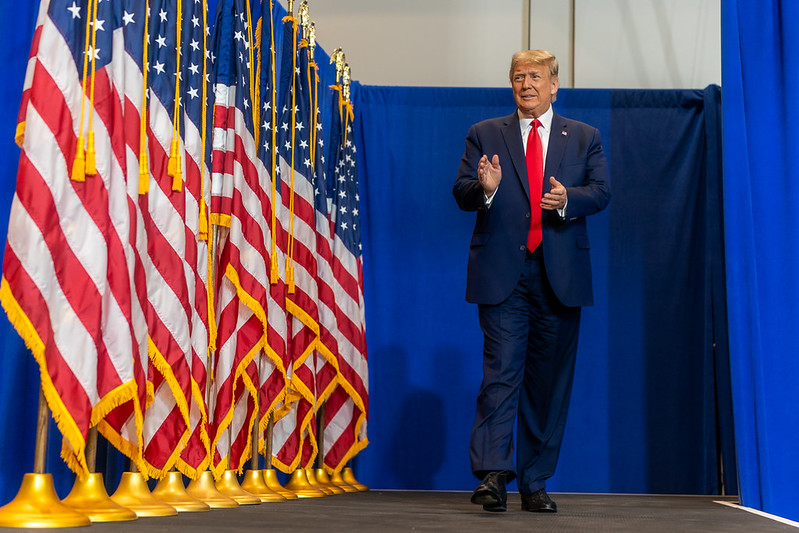
President Donald J. Trump delivers remarks on Protecting America’s Seniors Friday, Oct. 16, 2020, at the Caloosa Sound Convention Center & Amphitheater in Fort Myers, Fla. (Official White House Photo by Shealah Craighead)
Fortress America
The just-elected Donald Trump is to be sworn in this Monday morning. Whether you look at this as a blessing or a curse, it is hard not to admit that Mr. Trump won a clear victory in November. Yet another way to view it, offers to Kyle Peterson in the WSJ, even though it might not comfort you, Joe Biden and Kamala Harris “decisively” lost.
Imperial Ambition: America First Chauvinism
The mood across these fair lands already seems to have changed. The hope here is for a less chaotic, more productive Trump second term – one that would jolt America out of the wokeism, defeatism that recently has not only undermined it but also threatened to smother America. Like William McKinley, one of Donald Trump’s favorite presidents, the 25th president of the US liked to call the mission of the US one of “benevolent assimilation.”
Few Trump supporters will easily forget how Trump barely dodged a bullet while campaigning in 2024 in Pennsylvania. McKinley wasn’t as lucky. He was assassinated in 1901, notes Freddy Gray, before Mr. Gray lists seemingly non-lethal traits shared by Trump and McKinley:
- Scottish ancestry
- Ferocious work ethic
- An affinity with the super-rich that somehow appeals to the working classes
- A faith in tariffs as a means of safeguarding industry
- A willingness to expand America’s empire to boost future prosperity
Benevolent Assimilation
Tunku Varadarajan, a contributor to the WSJ, has hopes Donald Trump will become the 21st Century Ronald Reagan. As Varadarajan observes, Reagan and Trump diverged on many policies, but their personal effect on America’s morale could be comparably electrifying.
Mr. Trump could jolt it out of its malaise, prod it out of its defeatism, and lance the boils of wokeism that mar the body politic. This wouldn’t merely bring joy to this country; it would be welcomed by the world. Demand for a strong America is huge and global. For the past four years there’s been little supply.
Why the Interest in Greenland
Greenland is reportedly the largest island in the world and is a potential source of many minerals that are critical for energy transition. For example, the island is rich in minerals and the rare-earth elements that make semiconductors work and drive our technological age. Mr. Gray briefs Spectator US readers on the long-term implications of this broader strategy:
The territory is also likely to be an increasingly important asset when it comes to intercontinental trade, as improved ice-breaking technology and, perhaps, climate change (unlock) the frozen North Sea passages. US military chiefs have long been sensitive to China and Russia’s maneuvers in the Arctic Circle.
America’s annexation of Greenland is part of Trump’s broader strategy to counter Beijing’s Belt and Road initiative.
One soon-to-be member of the Trump administration foresees an alternative to a US Belt and Road-type scenario. Donald Trump, during the Covid crisis, was alarmed at US vulnerability. “Global supply routes” hampered the US, while recent Houthi attacks on international shipping lanes in the Gulf of Aden and the Red Sea” have done nothing to still the concern.
Marco Rubio, Trump’s secretary of state, national security adviser Mike Waltz, and the under-secretary of defense Elbridge Colby are all similarly exercised about China’s naval expansion. The three are determined to re-establish America as the ruler of the waves.
Optimists look to Trump 2.0 to allow America to help her achieve a far more assertive sea power. The goal is to mimic, if not surpass, China’s tactics of buying ports and strategic assets and aggressively reclaiming control of the key water lanes, especially around Panama, the Caribbean, and southern America. As Mr. Gray highlights, it’s no coincidence that Rubio is of Cuban origin and his deputy is Christopher Landau, whose background is in Latin-American diplomacy.
Trump 2.0 isn’t the first administration to take a keen interest in the seas.
The American naval strategist Alfred Thayer Mahan’s preoccupation with British sea power shaped the thinking of McKinley and after him (President) Teddy Roosevelt. Both men used American warships to assert dominance in the western hemisphere, long before the advent of the League of Nations and the liberal idealism of Woodrow Wilson.
What Rules?
Greatness in the Americas gained momentum towards the end of the 19th century, when tariffs generated vast wealth for the American industrial robber baron complex. At the time, the US wasn’t troubled by what today is called the “liberal rules-based order.”
China and Russia aren’t playing by the rules anyway, runs the logic, so why should we?
From the Proclamation of President Wiliam McKinley:
…that the mission of the United States is one of benevolent it should be the earnest wish and paramount aim of the military administration to win the confidence, respect, and affection of the inhabitants … by assuring them in every possible way that full measure of individual rights and liberties, which is the heritage of free peoples, and by proving to assimilation substituting the mild sway of justice and right for arbitrary rule.
May God bless America and her 47th President. Enjoy the inauguration of Donald Trump.
If you’re willing to fight for Main Street America, click here to sign up for the Richardcyoung.com free weekly email.




